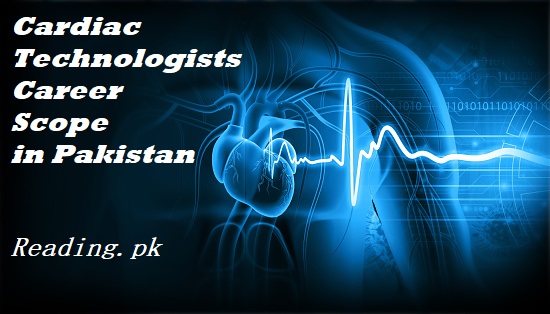We will present full information on Cardiac Technologist in Pakistan, including work opportunities, salaries, disciplines, and universities that offer cardiac perfusion admission. There is comprehensive information on becoming a cardiac technician or pursuing a career in cardiovascular science, including requirements for education, courses, employment, employment prospects, duties, and jobs.
Cardiovascular technologists and technicians assist physicians in the diagnosis and management of peripheral cardiovascular (blood vessel) and heart diseases. Specialists in medicine who work with the circulatory system include cardiovascular technologists.
To capture photos that physicians can utilise to make a diagnosis, they use a variety of medical instruments. They focus on vein and heart vein imaging, even though these professionals are known as “vascular technicians.” Cardiovascular technicians must be able to manage equipment, position patients correctly, and keep current on new methods and technology.
Successful cardiologists ultimately need the right training, certification, and on-going education.
A cardiovascular technician works in a cardiac laboratory and is capable of carrying out extremely difficult treatments including the implantation of stents, the use of cardiac pacemakers and defibrillators, and other tests that aid in the diagnosis of heart conditions.
They respond to crises and assist in rescuing people who are experiencing heart attacks. The duty of installing and running heart-lung technology that is concerned with monitoring and operating the functions occurring within the lungs and heart is performed by cardiac technologists. Additionally, they take part in the task of reviewing and analysing the patient’s medical background. The course lasts for around 4 to 5 years, which is the same amount of time as the MBBS course studies.
[lwptoc]
Cardiovascular technicians can focus on one of three distinct professions:
- Invasive Cardiology
- Cardiac Sonography
- Vascular technology/sonography
Cardiac Technologist Scope in Pakistan
Cardiac technologists work in a diverse and difficult sector in Pakistan. Currently, the riskiest populations for developing coronary heart disease (CHD) are those in Pakistan. In Pakistan, cardiovascular heart disease (CHD) accounts for between 30 and 40 percent of fatalities.
Cardiovascular technicians in Pakistan have several employment options in both private and governmental hospitals. It is one of the highest paying jobs in Pakistan. If you have a BSc in cardiac technology, you can also open your own clinic.
Cardiac Technologist Career Opportunities
There are growing numbers of commercial firms, particularly in the field of cardiac ultrasonography, as well as cardiac investigation departments in many significant metropolitan and regional governments as well as private hospitals. States and institutions have different educational possibilities and job grading scales. Cardiac technologists in Pakistan have access to the following job prospects.
- Educational Institutions
- Government Hospitals
- Private Practice Clinics
- Private Hospitals
- Research centers
- Sports Areas
- Online Rehabilitation Consultancy
- Director of Nursing
- Nurse Administrator
- Forensic Nurse
- Assistant Nursing Superintendent
- Nurse Supervisor
- Nursing Lecturer
- Staff Nurse
- Nurse Principal
- Researcher
Cardiac Technologist Career Scope in Pakistan
Required Qualification
A university degree with an emphasis in biophysics, health sciences, nursing, physiology, and exercise physiology is often required to become a cardiac technician. When working as a cardiac technician, you might need to continue your education in the area of cardiac technology and will get some on-the-job training. There are several university requirements, some of which give unrestricted admission requirements or offer an outside course of study.
Responsibilities & Tasks of a Cardiac Technologist
The obligations and duties are as the following:
- see the electrical activity of the heart that is being recorded. It is possible to interpret the heart’s rhythm and routine using the heart rate and its rhythm and pattern.
- Electrocardiography (ECG) recording, stationary bikes, or treadmills can be used to assess the cardiac response of patients to exercise.
- Utilising computers, test cardiac pacemakers placed
- During interventions, keep track of and observe blood pressure and ECG data.
obtaining ECG information from the heart to identify and address aberrant heart rhythms - Use ultrasound equipment to inspect the heart’s chest wall, take measurements of the heart, and take photos of the heart to check for abnormalities in the valves and blood flow.
- Use these methods to investigate the impact of cardiovascular drugs and other illnesses.
Requirements for Cardiovascular Technologists
A cardiovascular technician must attend school to obtain a bachelor’s or associate’s degree. Initial training lasts for a year, followed by a second year of training in one of the following specialties:
- For students who intend to work with cardiac catheterization equipment or in the heart catheterization lab, invasive cardiology may additionally encompass electrophysiology
- Cardiology without invasive procedures for students who want to participate in Holter Monitor, Stress, or pacemaker testing.
- For students who want to do cardiovascular ultrasonography, noninvasive echocardiology
- For students interested in peripheral vascular cardiology, there is noninvasive vascular cardiology.
a methodical and considerate attitude to work - Taking a professional, compassionate, and encouraging attitude to patients’ safety standards
strong communication abilities - A dedication to pursuing professional development
the capacity to work as a team
Cardiovascular Technologists Employment Areas
The main concern for those with a degree in cardiac technology is what types of employment opportunities are accessible in Pakistani nursing.
- Clinics Sectors
- Factories Departments
- Hospital Centers
- Heath Departments and Centers
- Industrial Sectors
- Military Houses
- Medical Departments and Centers
- Nursing Home Centers
- Orphanage Centers
- Old Age Centers
- Railways Departments
- Educational Centers
- Training Centers
This study has received a tonne of attention internationally in addition to Pakistan. You can go to both public and private clinics and hospitals. According to reports, Saudi Arabia has a huge untapped market for skilled cardiac technicians. They see this industry as offering a greater variety of payment possibilities in addition to being credible and trustworthy.
Cardiac Technologist Salary In Pakistan:
Cardiac perfusion technologists make an excellent living in Pakistan. In Pakistan, about one in every three people suffers from heart illness. Cardiac Perfusion technicians in the public sector earn between Rs. 20,000 and Rs. 25, 000/- per month, with a few earning up to Rs. 50,000/- per month.
Only the most senior 15-20 year experienced individuals make 2 -3 lacs. This is a sizable wage package that will earn jobs not just in Pakistan, but in most other nations where Coronary Heart Disease (CHD) is prevalent.
Which universities offer Cardiac Technologist in Pakistan?
- Khyber Medical University
- Zia-ud-Din Medical University
- Armed Forces Postgraduate Medical Institute
- Bashir Institute of Health Sciences
- Faisalabad Institute of Cardiology
- King Edward Medical University
- National University of Medical Sciences
- Jinnah Sindh Medical University
- Shaheed Zulfiqar Ali Bhutto Medical University

